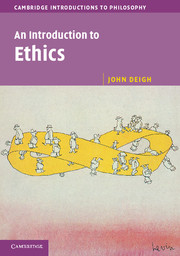Works citedSuggested further readingsAquinas, Thomas. Summa Theologica.
, Aristotle. Nicomachean Ethics.
Bentham, Jeremy. An Introduction to the Principles of Morals and Legislation.
Butler, Joseph. Fifteen Sermons Preached at the Rolls Chapel.
Camus, Albert. The Myth of Sisyphus and Other Essays, O'Brien, J., trans. (New York: Vintage Books, 1955).
Carroll, Lewis. Through the Looking Glass (and What Alice Saw There).
Dostoyevsky, Fyodor. Notes from Underground/The Double, Coulson, J., trans. (Harmondsworth, England: Penguin Books, 1972).
, Epicurus. “Principle Doctrines.”
Forster, E. M. Two Cheers for Democracy (New York: Harcourt Brace, 1951).
Grotius, Hugo. On the Law of War and Peace, Kelsey, F. W, trans. (Oxford: Oxford University Press, 1925).
Hobbes, Thomas. Leviathan.
Hume, David. A Treatise of Human Nature.
James, William. The Principles of Psychology, 2 vols. (1890; reprinted New York: Dover Publications, 1950).
Kant, Immanuel. Critique of Practical Reason, Beck, L. W., trans. (Indianapolis, Ind.: Bobbs-Merrill, 1956).
Kant, Immanuel. Groundwork of the Metaphysics of Morals, Paton, H. J., trans. (New York: Harper & Row, 1964).
Mill, John Stuart. Utilitarianism.
Moore, G. E.Principia Ethica (Cambridge: Cambridge University Press, 1903).
, Plato. Republic.
Prichard, H. A. “Does Moral Philosophy Rest on a Mistake?” Mind 21 (1912): 21–37.
Sartre, Jean-Paul. “L'existentialisme est un humanisme”; reprinted as “Existentialism Is a Humanism,” Mairet, Philip, trans., in Existentialism from Dostoevsky to Sartre, Kaufmann, Walter, ed. (Cleveland: The World Publishing Co., 1956).
Sheinwold, Alfred.5 Weeks to Winning Bridge, rev. edn. (New York: Pocket Books, 1964).
Sidgwick, Henry.The Methods of Ethics, 7th edn. (London: Macmillan and Co., 1907).
Twain, Mark. The Adventures of Huckleberry Finn.
Chapter 1Bennett, Jonathan. “The Conscience of Huckleberry Finn,” Philosophy 49 (1974): 123–34.
Darwall, Stephen. The Second Person Standpoint (Cambridge, Mass.: Harvard University Press, 2006).
Ross, W. D.The Right and the Good (Oxford: Clarendon Press, 1930).
Strawson, P. F. “Social Morality and Individual Ideal,” Philosophy 36 (1961): 1–17.
Chapter 2Broad, C. D. “Egoism as a Theory of Human Motives,” Hibbert Journal 68 (1950): 105–14; reprinted in Broad's Critical Essays in Moral Philosophy, Cheney, David, ed. (London: George Allen & Unwin Ltd, 1971), pp. 247–61.
Gauther, David. “Assure and Threaten,” Ethics 104 (1994): 690–721.
Kavka, Gregory.Hobbesian Moral and Political Theory (Princeton, N.J.: Princeton University Press, 1986).
Sidgwick, Henry. “Egoism,” in The Methods of Ethics, 7th edn. (London: Macmillan & Co., 1907), bk. II, pp. 119–95.
Sidgwick, Henry. “Pleasure and Desire,” in The Methods of Ethics, bk. I, ch. 4, pp. 39–56.
Chapter 3Annas, Julia.Introduction to Plato's Republic (Oxford: Clarendon Press, 1981).
Griffin, James.Well-Being: Its Meaning, Measurement and Moral Importance (Oxford: Clarendon Press, 1986).
Kraut, Richard.Aristotle on the Human Good (Princeton, N.J.: Princeton University Press, 1989).
, Plato. Gorgias.
Sachs, David. “A Fallacy in Plato's Republic,” Philosophical Review 72 (1963): 141–58.
Chapter 4Kagan, Shelly.The Limits of Morality (Oxford: Clarendon Press, 1989).
Lyons, David.Forms and Limits of Utilitarianism (Oxford: Clarendon Press, 1965).
Parfit, Derek.Reasons and Persons (Oxford: Clarendon Press, 1984).
Railton, Peter. “Alienation, Consequentialism, and the Demands of Morality,” Philosophy & Public Affairs 13 (1984): 134–71.
Rawls, John. “Two Concepts of Rules,” Philosophical Review 64 (1955): 3–32.
Urmson, J. O. “The Interpretation of the Moral Philosophy of J. S. Mill,” Philosophical Quarterly 3 (1953): 33–39.
Chapter 5Adams, Robert M. “A Modified Divine Command Theory of Ethical Wrongness,” in Religion and Morality: A Collection of Essays, Outka, Gene and Reeder, John P., Jr., eds. (Garden City, N.J.: Anchor Press, 1973), pp. 318–47.
Herman, Barbara. “Mutual Aid and Respect for Persons,” Ethics 94 (1984): 577–602.
O'Neil, Onora. Acting on Principle: An Essay on Kantian Ethics (New York: Columbia University Press, 1975).
Ross, W. D. The Right and the Good (Oxford: Clarendon Press, 1930).
Schneewind, J. B.The Invention of Autonomy (Cambridge: Cambridge University Press, 1998).
Strawson, P. F. “Ethical Intuitionism,” Philosophy 24 (1949): 23–33.
Chapter 6Camus, Albert. The Stranger, Gilbert, Stuart, trans. (New York: Alfred Knopf, 1946).
Hill, Thomas E., Jr. Dignity and Practical Reason in Kant's Moral Theory (Ithaca, N.Y.: Cornell University Press, 1992).
Korsgaard, Christine. “The Right to Lie: Kant on Dealing with Evil,” Philosophy & Public Affairs 15 (1986): 325–49.
Nagel, Thomas. “The Absurd,” Journal of Philosophy 68 (1971): 716–27.
Sartre, Jean-Paul. Being and Nothingness, Barnes, Hazel, trans. (New York: Washington Square Press, 1956).
Wood, Allen. Kant's Ethical Thought (Cambridge: Cambridge University Press, 1999).
Chapter 7Anscombe, G. E. M. Intention, 2nd edn. (Ithaca, N.Y.: Cornell University Press, 1963).
Árdal, Páll S.Passion and Value in Hume's Treatise, 2nd edn. (Edinburgh: Edinburgh University Press, 1989).
Davidson, Donald. “Action, Reasons, and Causes,” Journal of Philosophy 60 (1963): 685–700.
Frankfurt, Harry. “Free Will and the Concept of a Person,” Journal of Philosophy 68 (1971): 5–20.
Korsgaard, Christine. “Skepticism about Practical Reason,” Journal of Philosophy 83 (1986): 5–25.
Nussbaum, Martha.The Fragility of Goodness: Luck and Ethics in Greek Tragedy and Philosophy (Cambridge: Cambridge University Press, 1986), ch. 9.
Stocker, Michael. “Desiring the Bad,” Journal of Philosophy 76 (1979): 738–53.
Velleman, J. David. “The Guise of the Good,” Nous 26 (1992): 3–26.
Wiggins, David. “Truth, Invention, and the Meaning of Life,” Proceedings of the British Academy 62 (1976): 331–78.
Williams, Bernard. “Internal and External Reasons,” in Rational Action, Harrison, Ross, ed. (Cambridge: Cambridge University Press, 1980), pp. 17–28; reprinted in B. Williams, Moral Luck (Cambridge: Cambridge University Press, 1981), pp. 101–13.



